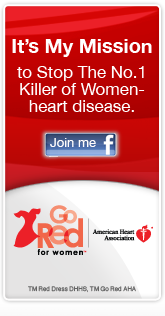It’s on.
I’ve been stress-tested, blood-tested, and pressure-tested. I’ve been examined, reviewed, and notated. Poked, prodded, and medicated.
And all the tests and medical professionals have come to the same conclusion: There’s nothing really wrong with you, except for that heart attack thing. So yes, go ahead and train for that marathon. Go ahead and live your life.
Oh, I will, and oh, it’s on.
It isn’t quite that simple, of course, but that’s the (ahem) heart of the matter. There are a few rules to follow now that I’m a survivor. But I like it that way.
My first post-heart attack stress test was last November, and I passed it with ease. The test showed perfect heart function and no scarring, and while there is blockage in other arteries (that may either build up slowly or rupture spontaneously someday), it wasn’t restricting blood flow. Dr. Murad, my cardiologist, said then: “It’s like [the heart attack] didn’t happen. But you know it did, and I know it did. We were there.”
I was given the green light to resume vigorous exercise (which my trainers have taken extremely literally), and told I could probably try a marathon again. “But let’s check again in May.”
So last week we checked again. And by checked, I mean I had nuclear isotopes injected into an IV and then a 3D scan of my heart done in a kind of MRI machine. Then I ran on a treadmill at an ever-increasing incline while wired to an EKG machine and having my blood pressure taken every minute. When you are about to collapse — like you really can’t go another step — you cry uncle and then they shoot you full of isotopes again and you have to keep going for one more minute. When you are done, it’s back in the MRI machine to see what your heart is doing under . . . well, stress.
Again I passed this one with ease, if being injected with stuff that comes in a locked, lead box is easy. My heart shows “excellent exercise tolerance” and “completely normal blood flow.” And after obtaining sign offs on my training plan from Dr. Murad (“In my opinion, you can train for your marathon”), my trainers (“I’m gonna want to see your training plan. Are you resting enough?”), my old friends in cardiac rehab (“Cut back on the mileage in the later weeks; it is better to under-train than over-train. And take some vitamin D.”), my primary doctor (“Do I think it is okay, yes. Do I think it is wise, no.”), and even my ob/gyn (though that was just scheduling coincidence), I’m allowed to train for the Twin Cities Marathon.
But . . .
I’d better actually do the training. Because if they suspect I am not fully prepared, or that I’m pushing through something or forcing or sagging and lagging like I was last summer when I was training while getting ever sicker, they are going to pull the plug on their approval, like my trainer just did for the half marathon I was going to do June 2. (Having missed two long runs she doesn’t think I can make up the training and just powering through is not allowed.)
Here are my rules:
- I’m not to over-train.
- I’m required to stop if something feels wrong, not just assume I must be some kind of wimp and keep going.
- I can’t run if it is too hot.
- No anti-inflammatories. (That’s Advil. Marathon training with no Advil.)
Basically, don’t mess around, because you did have a heart attack, whether you feel sick or not. To quote Dr. Murad: “As we discussed, listen to your body, know your limits, and train within yourself. Be safe.”
And really, this is the best thing they could have done for me or said to me. Because I do better with training when the rules are clear, the consequences are obvious, and someone’s looking over my shoulder. I can’t skip a work out because if I do I might ending up missing the whole thing. And I really don’t want to miss it again. This year, I’ve got something to prove.
It’s so on.



You’re so motivating. I’m running my first half marathon at the end of this month. You’re an inspiration!
Thank you Kate! Good luck on your race!